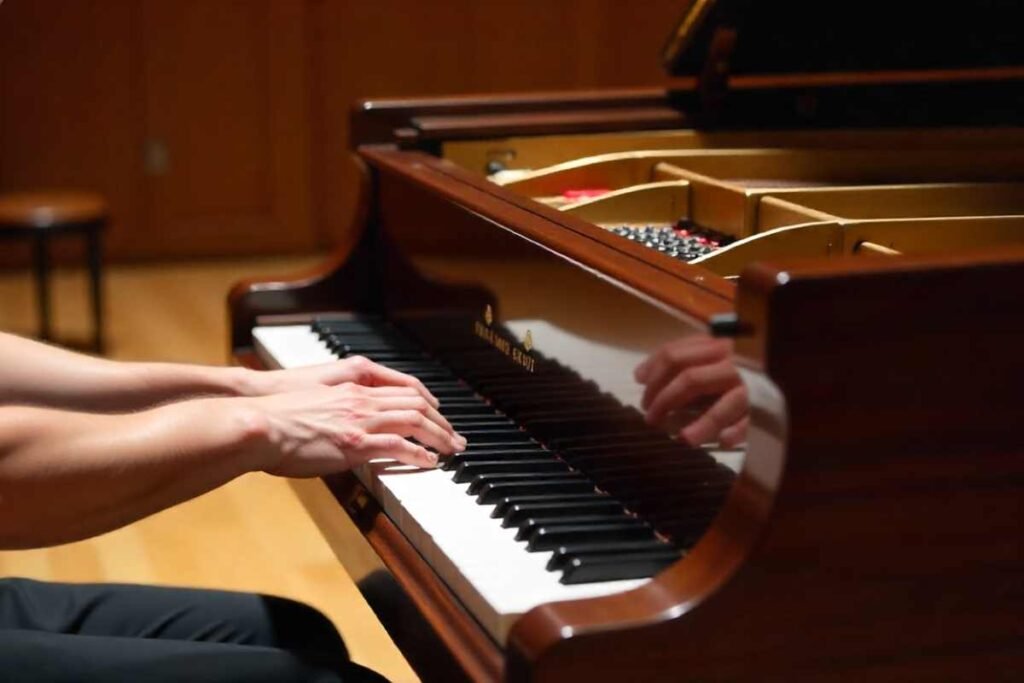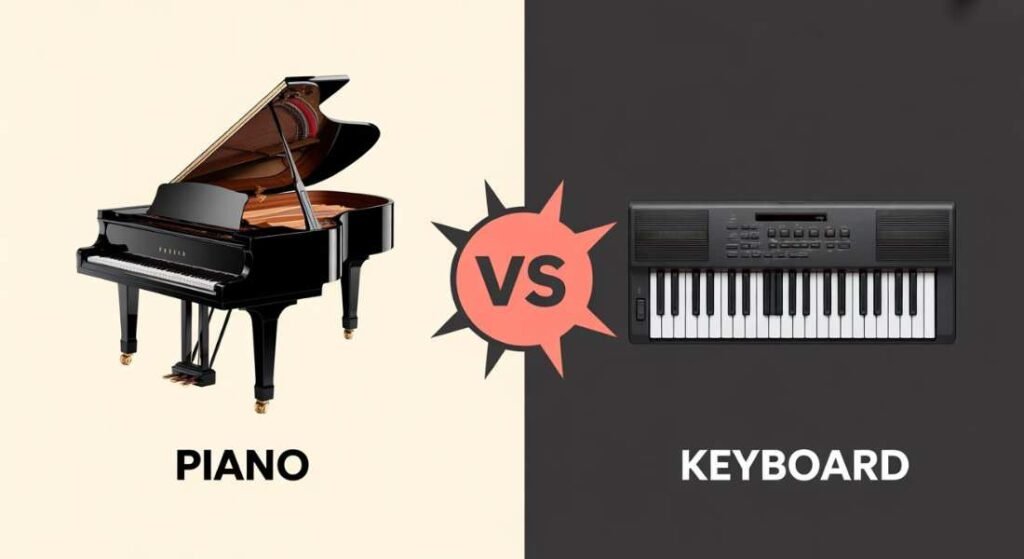The difference between piano and keyboard is one of the most common questions among beginners in music. Many people often confuse the two instruments assuming they are the same because of their similar appearance.
However while both have black and white keys the piano and keyboard differ in sound design cost portability and learning style. In this article we will explore their definitions key features benefits and practical insights that highlight the real difference between piano and keyboard.
What is Basics of Piano?

A piano is a traditional acoustic instrument invented in the 18th century. It works by striking strings with felt-covered hammers when keys are pressed. This mechanism produces rich resonant tones that can fill a concert hall without any electronic amplification. The piano is heavy, often made of wood, and usually comes in two main forms: the grand piano and the upright piano. The main difference between piano and keyboard begins with this acoustic, string-based design.
What is Basics of Keyboard?
A keyboard on the other hand is an electronic instrument that mimics the sound of a piano and many other instruments. It does not have strings or hammers. Instead it uses digital sound samples or synthesized tones to create music. Keyboards are much lighter portable and versatile compared to pianos.
Unlike the piano the keyboard can store rhythms play backing tracks and connect to computers or amplifiers. This is a crucial difference between piano and keyboard that impacts how each instrument is used in modern music depth-tutorials-and-guides/.
Historical Development and Evolution
The piano has a long history dating back to the early 1700s evolving from the harpsichord. Over the centuries it became a symbol of classical music performance and home entertainment. The keyboard however is a product of modern technology developed in the 20th century.
While the piano represents tradition the keyboard reflects innovation. The historical difference between piano and keyboard lies in their origins one rooted in craftsmanship and acoustic sound the other in digital engineering.
Sound Quality and Tone
One major difference between piano and keyboard is sound quality. Pianos produce natural warm and dynamic tones because the sound comes directly from vibrating strings. The force with which a player presses the keys creates a wide range of expression. Keyboards however rely on digital samples. While some high end keyboards can closely imitate piano tones the richness of an acoustic piano is often unmatched. This tonal difference influences how musicians experience and interpret music.
Portability and Space Requirements
When comparing the difference between piano and keyboard, portability is a key factor. Pianos, especially grand pianos are large heavy and require permanent placement in a room. They are not easy to move and demand proper space. Keyboards by contrast are compact and lightweight.
Musicians can easily carry them for live performances, practice sessions, or studio recordings. For students living in small apartments or dorms, the portability of a keyboard makes it a practical choice over a piano.
Cost and Affordability
Another significant difference between piano and keyboard is cost. Acoustic pianos are expensive due to their craftsmanship materials and size. Maintenance such as regular tuning also adds to the cost. Keyboards are generally much more affordable and come in various price ranges. Beginners can start with an entry level keyboard without spending thousands of dollars. For budget conscious learners the keyboard becomes the most accessible option.
Learning Experience and Technique

The learning process also highlights the difference between piano and keyboard. A piano has weighted keys, which help develop finger strength control and proper hand technique. This is why classical teachers often recommend starting with a piano.
Keyboards however may have unweighted or semi-weighted keys which are easier to press but do not build the same skill foundation. While keyboards offer flexibility pianists argue that training on a piano builds discipline and technical mastery.
Features and Versatility
Keyboards stand out when it comes to versatility. Unlike the piano, a keyboard can produce a variety of sounds from strings and drums to modern synths. It often includes built in rhythms metronomes and recording options. These features allow musicians to explore different genres and experiment with creativity.
The piano although limited to one sound offers unmatched depth in tone and expression. This functional difference between piano and keyboard defines their role in both classical and contemporary music.
Maintenance and Durability
Maintenance needs also explain the difference between piano and keyboard. Acoustic pianos require regular tuning, humidity control and occasional repairs. They are sensitive to environmental changes which can affect their sound. Keyboards being electronic require minimal maintenance. As long as they are kept clean and safe from power issues, they can last for years without major servicing. This makes keyboards a low-maintenance choice compared to pianos.
Role in Classical and Modern Music
The difference between piano and keyboard becomes clear when looking at their roles in music. The piano dominates classical music jazz and traditional performances. Its expressive power makes it ideal for solo pieces and orchestral accompaniment. Keyboards however play a huge role in modern genres like pop electronic dance music EDM and hip hop. Their versatility and ability to produce synthetic sounds make them indispensable in modern studio
Step by Step Guide Choosing Between Piano and Keyboard?
When deciding, here is a step-by-step approach to understand the difference between piano and keyboard:
Step 1: Define Your Goals
If you want classical training a piano is the right choice. For versatility and experimentation a keyboard is better.
Step 2: Consider Budget
If affordability matters, start with a keyboard. If investment in quality is possible choose a piano.
Step 3: Evaluate Space
If you have limited room go for a keyboard. Larger homes may accommodate a piano.
Step 4: Assess Maintenance
Keyboards require little upkeep. Pianos demand tuning and professional care.
Step 5: Long Term Learning
For building strong technique, the piano is better. For flexibility and fun, keyboards excel.
This structured approach makes the difference between piano and keyboard easier to understand.
Common Misconceptions About Piano and Keyboard

Many people believe that playing the keyboard is the same as playing the piano. While the basic key layout is similar the technique differs. Another misconception is that keyboards are only for beginners while pianos are for professionals. In reality, many professional musicians use keyboards in performances and recordings. Recognizing these misconceptions helps clarify the true difference between piano and keyboard
Conclusion
In summary, the difference between piano and keyboard lies in sound design cost portability and learning style. The piano offers authenticity expression and tradition while the keyboard provides versatility affordability and modern features. Choosing between them depends on personal goals budget and musical interests. Whether you lean toward the timeless beauty of a piano or the digital flexibility of a keyboard both instruments can inspire creativity and lifelong musical growth.
FAQs
What is the main difference between piano and keyboard?
The piano is an acoustic instrument with strings and hammers while the keyboard is electronic and produces digital sounds.
Is it better to learn piano or keyboard first?
If you want classical training the piano is best. For flexibility and affordability the keyboard is a good starting point.
Do keyboards feel the same as pianos?
Not always. Pianos have weighted keys while many keyboards have lighter keys. Some advanced keyboards mimic piano touch.
Which is more affordable: piano or keyboard?
Keyboards are generally much cheaper than pianos making them more accessible for beginners.
Can a keyboard replace a piano?
Keyboards can imitate piano sounds but cannot fully match the depth and resonance of an acoustic piano.
Which instrument is better for professional musicians?
It depends on the genre. Classical and jazz musicians prefer pianos, while modern and pop musicians often choose keyboards.


